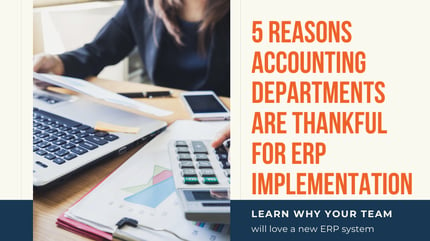5 Reasons Accounting Departments are Thankful for ERP Implementation
Chelsea Carter

One of the toughest things that a business owner can deal with is getting employees to use new software, like a cloud ERP system. Workers may have used the existing legacy systems and applications for many years. They balk at having to learn an entirely new system that will take days or weeks to understand as they worry about the impact to their productivity.
However, accounting departments will find enormous benefits with ERP integration that will help to streamline their financial tasks. When employees have more automation available that offers enhanced data visibility, it improves the accuracy of financial data, allows for generated reports to be more comprehensive, and provides enhanced budgetary controls and accountability.
What ERP Offers to Accounting Departments
Cloud ERP and in-house ERP offer centralized network solutions for accounting departments when they need to access data information. In-house ERP provides enhanced information control as sensitive data is kept on premises. Cloud ERP systems offer greater scalability for operations without minimizing security as real-time data can be accessed anytime and from anywhere over the Internet.
The biggest advantage to ERP features, whether on premise or cloud-based, for accounting and financial departments is that it offers everything that basic accounting software provides and more. Employees can still use banking, accounts payable/receivable, revenue tracking, sales tracking and financial reporting features. In addition, ERP also has customer relationship management (CRM) software that allows you to manage the information in other departments. Employees can use it to pull sales numbers, perform e-commerce strategy, monitor supply chains, and track inventory numbers.
Check out the 5 reasons why your accounting department will thank you for implementing ERP throughout your company.
1. Improved Data Access
Accounting departments deal with an interesting catch-22 in their tasks. They need to have an unfettered view of financial data so they can track and monitor expenses, revenue, and other budgetary concerns. At the same token, owners require that the financial data stays secure while only allowing access to authorized users.
Cloud ERP provides improved data access by offering one centralized network system, so accounting employees can pull up financial information from the sales department, warehouse management, and other areas of the company. The information is available in real-time whenever they require it. In addition, owners have the ability to set permissions regarding who can access, read, and modify information.
2. Easier Revenue and Billing Management
ERP integration offers a range of tools that every department in your company can use in different ways based on their specific tasks. For accounting departments, the customer relationship management functionality of the ERP system provides automated payment features so vendors are always paid on time. Employees can create customer payment schedules as well as provide enterprise-wide credit management.
Revenue tracking is another added benefit to cloud ERP. Accounting departments can perform more in-depth cost analysis, invoice tracking, and profit tracking. With these reports, they can help business owners develop budgets that align better to company objectives and processes while seeking the appropriate investments.
3. Lowers Human Errors
Inputting errors can occur when employees have to manually enter financial information into documents and records. To minimize these errors, employees can use the automated features available in ERP systems. The data is automatically placed into the correct documents and fields in every department system, as the records are modified in real-time.
When accounting workers see and work with the data, they have greater confidence that the information is correct as they can provide better record-keeping and budget balancing tasks. Another important benefit with using ERP to lower human errors is that the company can avoid tax complications that could result in fines and penalties, according to the National Society of Accountants.
4. Global Enterprise Integration
For large organizations that may span different regions and countries, accounting departments have to deal with different languages, currencies, and accounting charts. They need to generate information that can be used with owners and shareholders, as employees must pull the right financial numbers and prioritize data that is vital to operate the company.
With cloud ERP, workers can pull financial data from the entire organization as network systems are globally connected through the Internet. The accounting department can obtain the information from companies no matter where they are located and create comprehensive reports so shareholders and owners can make more informed company decisions.
5. Tracking and Accountability Features
Financial tracking is vital when it comes to accounting data. When modifications are made to the data, you want your accountants to know who made the changes and the reasons why.
ERP integration can be used to monitor and track financial data changes that are made. The system enhances accountability when there are financial issues, budget overruns, or revenue discrepancies. Accounting and financial departments can track down the problems and implement remediation policies to get the budget back on track.
See What ERP Can Do for You
Whether you are operating a small business and handling the daunting accounting tasks yourself, or you have a large accounting department that is using old legacy systems, you can take advantage of the benefits that ERP systems can offer. Contact Manobyte to learn more about the ERP options that are available for your business operations.

